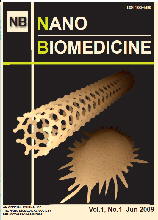
Nano Biomedicine
ORIGINAL ARTICLE
Culture of ES Cells and Mesenchymal Stem Cells on Carbon Nanotube Scaffolds
Hiromi KITAHARA1, Yoshinori KUBOKI2, Hiroko TAKITA3, Tsukasa AKASAKA2, Fumio WATARI2, and Nobuo INOUE1
1Department of Dentistry for a Senior Person,
2Department of Biomedical, Dental Materials and Engineering,
3Support Section for Education and Research,
Graduate School of Dental Medicine, Hokkaido University, Sapporo, Japan